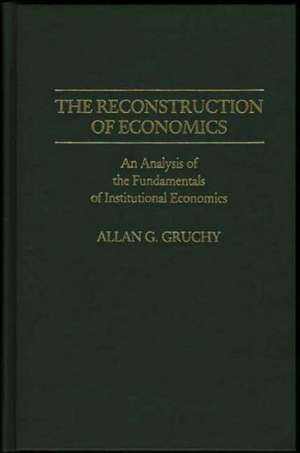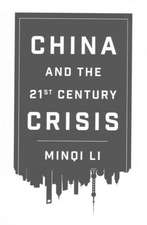The Reconstruction of Economics: An Analysis of the Fundamentals of Institutional Economics: Bibliographies and Indexes in Religious Studies, cartea 71
Autor Allan Garfield Gruchyen Limba Engleză Hardback – 31 mai 1987
Allan Gruchy, the elder statesman of the institutionalist school of economic thought, has written a book which is important because it is both insightful and profound. Gruchy seeks to identify and to describe the essential unity of institutionalist economic thought. He finds the essence of institutionalism in the paradigmatic shift away from the old scientific paradigm of orthodox economics, which emphsizes static equilibrium, to the new scientific paradigm of institutionalist economics, which emphasizes dynamic process. . . . Gruchy calls for a reconstruction of economics which is long overdue. "Review of Social Economy"
The interpretations and solutions generated by orthodox economics, with its emphasis on efficiency and personal market forces, have failed to satisfy many economists. An alternative framework has been developed in the past eight decades by institutional economists, who view the economic system not as a competitive equilibrium to be kept in balance but as an ongoing economic process through which the material needs of its human participants are to be met. Although insitutional economics represents a major and growing body of work, it has not always been clear how it differs from other approaches. In his new book, Allan Gruchy, considered the dean of institutional economics, addresses this problem. Pointing up the underlying unity of work done in this field, he provides a clear, basic statement of what it is all about and what intellectual and social currents have shaped it.
Din seria Bibliographies and Indexes in Religious Studies
-
 Preț: 325.19 lei
Preț: 325.19 lei - 42%
 Preț: 319.49 lei
Preț: 319.49 lei - 51%
 Preț: 300.38 lei
Preț: 300.38 lei - 42%
 Preț: 252.76 lei
Preț: 252.76 lei - 42%
 Preț: 322.05 lei
Preț: 322.05 lei - 26%
 Preț: 475.53 lei
Preț: 475.53 lei - 42%
 Preț: 305.61 lei
Preț: 305.61 lei - 26%
 Preț: 390.94 lei
Preț: 390.94 lei - 42%
 Preț: 250.68 lei
Preț: 250.68 lei - 51%
 Preț: 302.00 lei
Preț: 302.00 lei - 42%
 Preț: 149.80 lei
Preț: 149.80 lei - 51%
 Preț: 252.20 lei
Preț: 252.20 lei - 42%
 Preț: 325.74 lei
Preț: 325.74 lei - 50%
 Preț: 308.45 lei
Preț: 308.45 lei - 42%
 Preț: 249.73 lei
Preț: 249.73 lei - 42%
 Preț: 302.20 lei
Preț: 302.20 lei - 51%
 Preț: 305.05 lei
Preț: 305.05 lei - 50%
 Preț: 305.51 lei
Preț: 305.51 lei - 42%
 Preț: 250.86 lei
Preț: 250.86 lei - 42%
 Preț: 252.67 lei
Preț: 252.67 lei - 42%
 Preț: 321.49 lei
Preț: 321.49 lei - 42%
 Preț: 300.57 lei
Preț: 300.57 lei - 40%
 Preț: 380.47 lei
Preț: 380.47 lei - 28%
 Preț: 438.00 lei
Preț: 438.00 lei - 43%
 Preț: 369.27 lei
Preț: 369.27 lei - 51%
 Preț: 301.25 lei
Preț: 301.25 lei - 51%
 Preț: 303.90 lei
Preț: 303.90 lei - 42%
 Preț: 302.28 lei
Preț: 302.28 lei - 40%
 Preț: 336.97 lei
Preț: 336.97 lei - 52%
 Preț: 250.68 lei
Preț: 250.68 lei - 51%
 Preț: 302.59 lei
Preț: 302.59 lei - 26%
 Preț: 390.94 lei
Preț: 390.94 lei - 43%
 Preț: 169.30 lei
Preț: 169.30 lei - 51%
 Preț: 301.61 lei
Preț: 301.61 lei - 42%
 Preț: 149.80 lei
Preț: 149.80 lei - 43%
 Preț: 249.25 lei
Preț: 249.25 lei - 52%
 Preț: 251.53 lei
Preț: 251.53 lei - 43%
 Preț: 412.82 lei
Preț: 412.82 lei - 41%
 Preț: 307.51 lei
Preț: 307.51 lei - 42%
 Preț: 323.47 lei
Preț: 323.47 lei - 27%
 Preț: 350.47 lei
Preț: 350.47 lei - 24%
 Preț: 459.41 lei
Preț: 459.41 lei - 42%
 Preț: 304.66 lei
Preț: 304.66 lei - 35%
 Preț: 461.00 lei
Preț: 461.00 lei - 48%
 Preț: 268.84 lei
Preț: 268.84 lei - 38%
 Preț: 344.38 lei
Preț: 344.38 lei - 26%
 Preț: 354.30 lei
Preț: 354.30 lei - 28%
 Preț: 437.84 lei
Preț: 437.84 lei - 38%
 Preț: 441.21 lei
Preț: 441.21 lei - 33%
 Preț: 321.54 lei
Preț: 321.54 lei
Preț: 436.57 lei
Preț vechi: 603.51 lei
-28% Nou
83.54€ • 87.45$ • 69.12£
Carte tipărită la comandă
Livrare economică 05-19 aprilie
Specificații
ISBN-10: 0313256799
Pagini: 193
Dimensiuni: 163 x 239 x 23 mm
Greutate: 0.45 kg
Editura: Greenwood Press
Seria Bibliographies and Indexes in Religious Studies
Descriere
The interpretations and solutions generated by orthodox economics, with its emphasis on efficiency and personal market forces, have failed to satisfy many economists. An alternative framework has been developed in the past eight decades by institutional economists, who view the economic system not as a competitive equilibrium to be kept in balance but as an ongoing economic process through which the material needs of its human participants are to be met. Although insitutional economics represents a major and growing body of work, it has not always been clear how it differs from other approaches. In his new book, Allan Gruchy, considered the dean of institutional economics, addresses this problem. Pointing up the underlying unity of work done in this field, he provides a clear, basic statement of what it is all about and what intellectual and social currents have shaped it.




